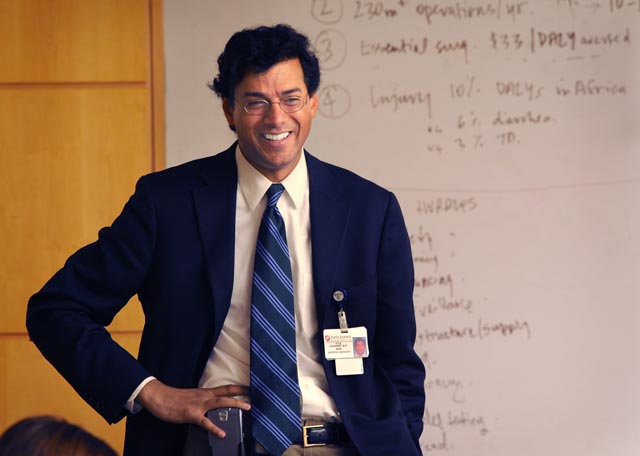
So powerful is Dr. Atul Gawande’s writing that Charlie Munger, Warren Buffett’s partner, sent him a $20,000 check without ever having met him, after reading ‘The Cost Conundrum’ his piece about healthcare in The New Yorker, the Huffington Post reports.
Gawande, being Gawande, did not accept the check personally but donated it to Brigham and Women’s Hospital Center for Surgery and Public Health for an international project.
Gawande’s passion and commitment comes through in his latest book.
“I have been trying for some time to understand the source of our greatest difficulties and stresses in medicine,” writes the noted physician and writer. “It is not money or government or the threat of malpractice lawsuits or insurance company hassles – although they all play their role. It is the complexity that science has dropped upon us and the enormous strains we are encountering in making good on its promise.”
Gawande fights this complexity with simplicity and offers a solution that is startling in its common sense value – the prosaic checklist. In his new book, ‘The Checklist Manifesto- How to Get Things Right’, he shares insights on how not only physicians and medical personnel but just about everybody with a project on hand can benefit from implementing this simple tool.
Gawande himself has such a busy and complicated life that it would seem a checklist would be needed to accomplish everything he does! A staff member of Brigham and Women’s Hospital, and the Dana Farber Cancer Institute, he is also a staff writer for The New Yorker. He is an associate professor of surgery at Harvard Medical School, an associate professor in the Department of Health Policy and Management at the Harvard School of Public Health, and research director for the BWH Center for Surgery and Public Health.
Perfecting outcomes has been a passion for Gawande and he is the author of ‘Complications’ and ‘Better: A surgeon’s notes on Performance’ which was a New York Times bestseller and one of Amazon.com’s ten best books of 2007. As Time magazine described it, “Gawande is a writer with a scalpel pen and an X-ray eye. Diagnosis: riveting.”
In his latest book, he delves deep into the problem of failure even as we have ever more sophistication in training and high technology. As he points out, studies show that at least 30 percent of patients with stroke receive incomplete or inappropriate care from their doctors, as do 45 percent of patients with asthma and 60 percent of patients with pneumonia. Half of heart attack patients don’t get treated in time.
Other startling facts that he mentions: there’s been 36 percent increase between 2004 and 2007 in lawsuits against attorneys for legal mistakes. 2/3 of death penalties are overturned because of errors. And then there are the mistakes made when hurricanes or tornados hit, mistakes of ineptitude.
In an increasingly complex world, the smallest errors can bring about failure. “You see it in flawed software design, in foreign intelligence failures, in our tottering banks – in fact, in almost any endeavor requiring mastery of complexity and of large amounts of knowledge,” he writes.
Part of the solution lies in something so mundane that professionals tend to overlook it. The simple checklist. Says Gawande: “They provide a kind of cognitive net. They catch mental flaws inherent in all of us – flaws of memory and attention and thoroughness. And because they do, they raise wide, unexpected possibilities.”
Gawande, who is the director of the World Health Organization’s Global Challenge for Safer Surgical Care, conducted a pilot study of a safe surgery checklist in many hospitals across the world, and found that complications in surgery fell by a third. Over a dozen countries have implemented the checklist in 2000 hospitals, and in the US about 10 percent of hospitals have adopted the checklist.
For readers, it’s an engrossing journey, and in a chapter titled ‘The Hero in the Age of Checklists’ you see firsthand the steps behind the recent breathtaking crash-landing of US Airways Flight 1549 on the Hudson River. With Gawande as traveling companion, we visit unlikely places such as a flight simulator, the bustling kitchen of a Boston restaurant, and into the guts and innards of emergency rooms and operation theaters. We see the difference a checklist can make, as in Columbus Children’s Hospital where an aviation style checklist helped to ensure that 100 percent of the appendicitis patients got the right antibiotics at the right time.
Atul Gawande’s evocative language fully embroils you in the action, right to the operation theater as he gets involved in a life and death surgery where the blood – and our adrenalin – flows profusely until the checklist saves the day. After reading the book, most people would want a checklist to be part of any medical procedure they undergo. And having a checklist for just about anything we undertake – simple or complex – seems a great idea. Better safe than sorry.
Related Post: Atul Gawande: The Rx for Excellence

